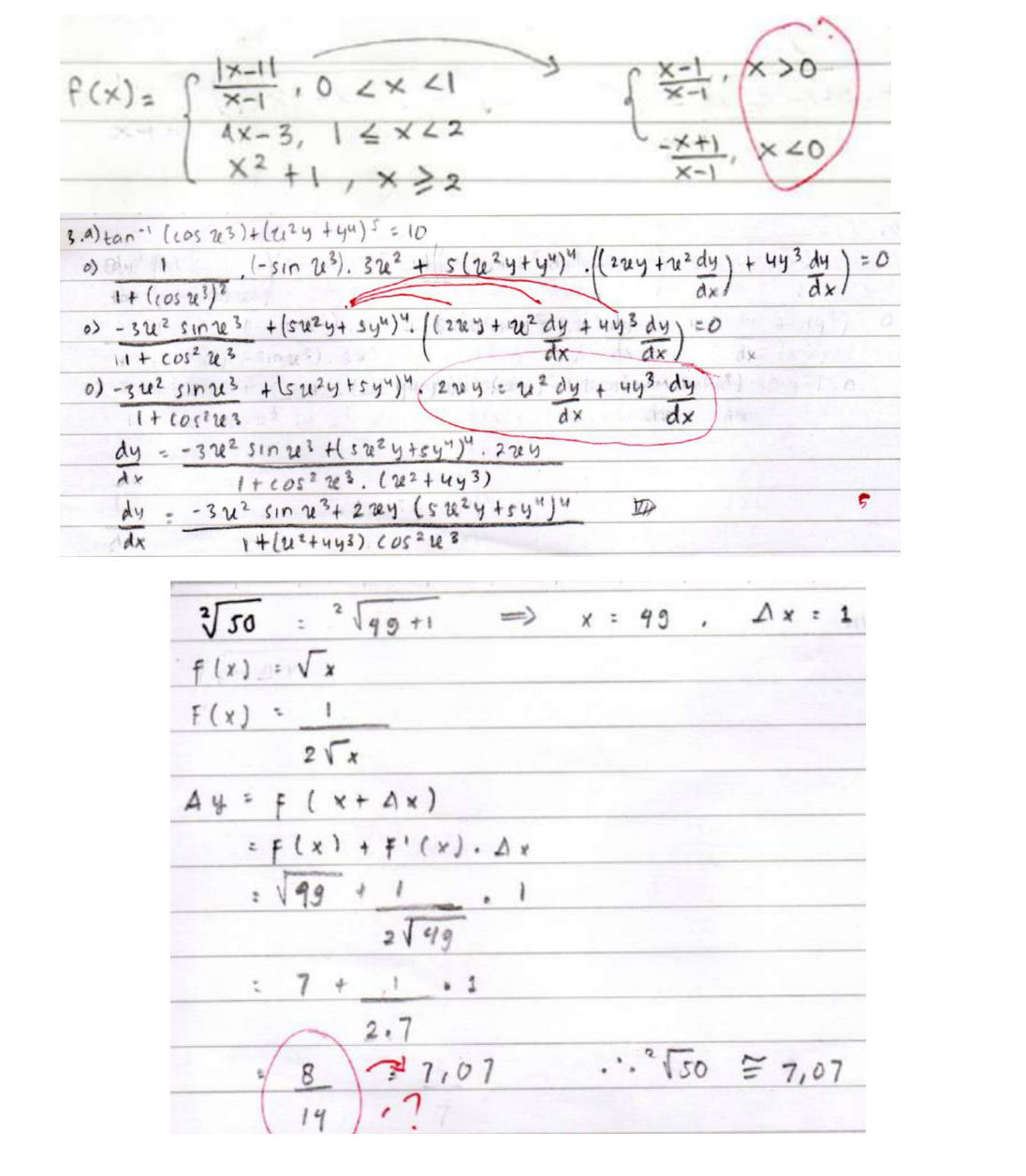Designing a Pre-Calculus Learning Module for Pre-Service Mathematics Teachers through the Hypothetical Learning Trajectory Approach
https://doi.org/10.51574/kognitif.v5i4.3629
Keywords:
Pre-Calculus Module , Hypothetical Learning Trajectory (HLT) , Learning ObstaclesAbstract
The study identified several learning obstacles (LO) experienced by students in Calculus I, particularly misconceptions related to algebraic concepts, graphical representations of functions, absolute values, inequalities, exponents, logarithms, and trigonometry. These obstacles negatively affect students’ conceptual readiness for learning Calculus. This study aims to develop an HLT-based pre-calculus module for 41 prospective mathematics teachers at a state university in Indonesia. The instruments included a diagnostic test, interview guidelines, and expert validation forms for the module. Data were collected through literature review, analysis of learning obstacles based on diagnostic test and interview results, and expert validation of the module. The pre-calculus module was developed using the 4D model (Define, Design, Develop, Disseminate), and the data were analyzed using a descriptive qualitative approach. Expert validation results indicated that the module’s content, language, and presentation achieved validity scores above 80% across all aspects. Considering the effectiveness of the HLT framework, the module is expected to support scaffolding, reduce misconceptions, and map students’ conceptual thinking trajectories. Furthermore, it is expected to serve as an independent learning resource that supports a logical transition from algebraic prerequisites to Calculus I concepts.
Downloads
References
Abadi, K. M., & Hidayanti, N. (2020). Pengembangan Modul Integral Menggunakan Geogebra berbasis revolusi 4.0. Jurnal Didactical Mathematics, 2(3), 128–136.
Apriyanti, M., Suweken, G., & Suparta, I. N. (2019). DEVELOPMENT OF HYPOTHETICAL LEARNING TRAJECTORY FOR LINEAR EQUATIONS WITH PISA AND SCIENTIFIC APPROACH MODEL CONSIDERATION. Jurnal Pengajaran Matematika Dan Ilmu Pengetahuan Alam, 24(2), 35–43. https://doi.org/10.18269/jpmipa.v24i2.15856
Arnellis, Suherman, & Amalita, N. (2019). IMPLEMENTASI LEARNING TRAJECTORY KALKULUS BERBASIS REALISTIC MATHEMATICS EDUCATION UNTUK MENINGKATKAN KEMAMPUAN BERPIKIR MATEMATIS TINGKAT TINGGI SISWA SMA KOTA PADANG. Menara Ilmu, 13(6), 11–18.
Brousseau, G. (2002). Theory of Didactical Situations in Mathematics (N. Balacheff, M. Cooper, R. Sutherland, & V. Warfield, Eds. & Trans.). Kluwer Academic Publisher.
Daro, P., Mosher, F. A., & Corcoran, T. (2011). LEARNING TRAJECTORIES IN MATHEMATICS: A Fiundation for Standards, Curriculum, Assesment, and Istruction. www.ccii-cpre.org
Hajizah, M. N., & Salsabila, E. (2024). Pengembangan Modul Ajar Kalkulus Diferensial untuk Mahasiswa Program Studi Pendidikan Matematika FMIPA UNJ. Jurnal Riset Pembelajaran Matematika Sekolah, 8(1), 27–35.
Hakiki, A. F., Livana, A., Selvianti, I., Febrianti, S. M., & Hernaeny, U. (2025). Kesulitan Mahasiswa pada Kalkulus Diferensial dengan Meningkatkan Kemampuan Berpikir Kritis. Jurnal Pendidikan Matematika, 2(2), 1–12. https://doi.org/10.47134/ppm.v2i2.1187
Hamdani, V., Armiati, Arnawa, I. M., & Jamaan, E. Z. (2023). Hypothetical learning trajectory trigonometry based on problem-based learning with Jambi malay ethnomathematics nuances. Al-Jabar: Jurnal Pendidikan Matematika, 14(2), 267–279. http://ejournal.radenintan.ac.id/index.php/al-jabar/index
Ismail, S., & Bempah, H. O. (2018). Analisis Kemampuan Berpikir Kritis Matematika Mahasiswa Jurusan Pendidikan Matematika Pada Mata Kuliah Kalkulus I Materi Limit Fungsi. Jurnal Entropi, 13(1), 7–13.
Khasanah, N. D. M., & Febriana, R. (2024). Filosofi Kalkulus dalam Sejarah Matematika. Absis: Mathematics Education Journal, 6(1), 43–51. https://doi.org/10.32585/absis.v6i1.4902
Mirza, A., Isnurani, & Rustam. (2022). HAMBATAN BELAJAR MAHASISWA PENDIDIKAN MATEMATIKA DALAM MATA KULIAH KALKULUS DIFERENSIAL. JURNAL SAINTIKA UNPAM : Jurnal Sains Dan Matematika Unpam, 5(1), 23–44.
Muhtadi, D., Yulianto, E., Hermanto, R., & Virawanti, T. (2024). LEARNING DESIGN OF EXPONENTIAL NUMBERS THROUGH THE DESIGN OF A HYPOTHETICAL LEARNING TRAJECTORY USING DISCOVERY LEARNING. Journal of Authentic Research on Mathematics Education, 6(1). https://doi.org/10.37058/jarme
Musyrifah, E., Dahlan, J. A., Cahya, E., & Hafiz, M. (2022). ANALISIS LEARNING OBSTACLES MAHASISWA CALON GURU MATEMATIKA PADA KONSEP TURUNAN. FIBONACCI: Jurnal Pendidikan Matematika Dan Matematika, 8(2), 187. https://doi.org/10.24853/fbc.8.2.187-196
Nurhayati, L., Priatna, N., Herman, T., & Dasari, D. (2023). LEARNING OBSTACLE PADA MATERI INTEGRAL (ANTIDERIVATIVE) DALAM TEORI SITUASI DIDAKTIS. AKSIOMA: Jurnal Program Studi Pendidikan Matematika, 12(1), 984–993. https://doi.org/10.24127/ajpm.v12i1.6470
Nurhayati, Y., & Ratnaningsih, N. (2023). Analisis kesalahan konsep Siswa pada materi sistem pertidaksamaan linear dua variabel. Primatika : Jurnal Pendidikan Matematika, 12(2), 153–164. https://doi.org/10.30872/primatika.v12i2.1754
Patmala, K., Deswita, R., & Ningsih, F. (2025). Hypothetical Learning Trajectory Logaritma Berbasis Pendidikan Matematika Realistik Indonesia terhadap Kemampuan Pemahaman Konsep. Jurnal Axioma: Jurnal Matematika Dan Pembelajaran, 10(1).
Puspita, E., Suryadi, D., & Rosjanuardi, R. (2022). LEARNING OBSTACLES OF PROSPECTIVE MATHEMATICS TEACHER STUDENTS ON THE CONCEPT OF CHAIN RULES AND ALTERNATIVE DIDACTIC DESIGNS. In Journal of Engineering Science and Technology Special Issue on ICMScE2022.
Ramadanti, F., & Pujiastuti, H. (2020). ANALISIS KESULITAN MAHASISWA PENDIDIKAN MATEMATIKA MENYELESAIKAN SOAL PADA MATA KULIAH KALKULUS I. 04(02), 487–494.
Septiani, R. D., & Harisman, Y. (2025). Studi Pemahaman Kalkulus: Uji Kemampuan Mahasiswa Pendidikan Matematika dalam Perhitungan Integral dan Diferensial. Jurnal Riset Pembelajaran Matematika Sekolah, 9(1), 28–42.
Sulastri, R., Suryadi, D., Prabawanto, S., & Cahya, E. (2022). Epistemological Obstacles on Limit and Functions Concepts: A Phenomenological Study in Online Learning. MATHEMATICS TEACHING RESEARCH JOURNAL, 14(5), 84–106.
Susilowati, E. (2021). ANALISIS KESALAHAN MAHASISWA DALAM MENYELESAIKAN SOAL KALKULUS LANJUT DENGAN EKA’S ERROR ANALYSIS. Jurnal Pembelajaran Matematika Inovatif, 4(1), 55–72. https://doi.org/10.22460/jpmi.v4i1.55-72

Downloads
Published
How to Cite
Issue
Section
License
Copyright (c) 2025 Ulfah Nur Azizah, Nadia Ulfa, Nurmala Setianing Putri

This work is licensed under a Creative Commons Attribution-ShareAlike 4.0 International License.
Education and Talent Development Center of Indonesia (ETDC Indonesia)
e-mail: kognitif@gmail.com, website : https://etdc-indonesia.com

Kognitif: Jurnal Riset HOTS Pendidikan Matematika dengan Situs: https://etdci.org/journal/kognitif berlisensi Creative Commons Attribution-ShareAlike 4.0 International License









.png)

